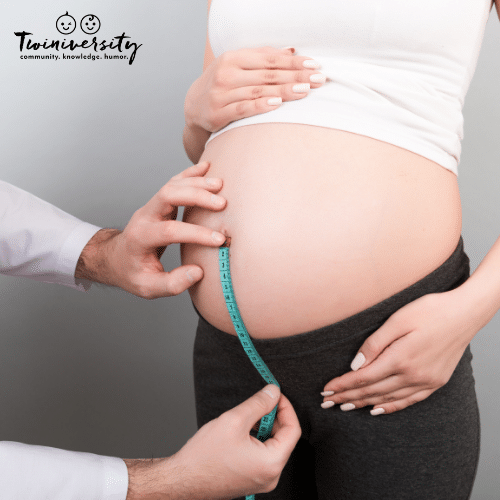Last updated on August 12th, 2024 at 05:35 pm
Congratulations, you’re having twins (or more)! One of the most important parts of a healthy multiples pregnancy is prenatal care, including frequent doctor’s appointments for check-ups and ultrasounds. Even if this isn’t your first pregnancy, you might feel anxious about what’s to come and how multiples pregnancy prenatal care differs from singletons. We’ve got you covered with everything you need to know about prenatal care and doctor’s appointments in your twin pregnancy.
Disclaimer: All content on this website, including medical opinion and any other health-related information, is for informational purposes only and should not be considered to be a specific diagnosis or treatment plan for any individual situation. Use of this site and the information contained herein does not create a doctor-patient relationship. Always seek the direct advice of your own doctor in connection with any questions or issues you may have regarding your own health or the health of others.

Our new digital twin pregnancy journal is up for sale on the Twiniversity Etsy store! This is the first and only digital journal exclusively for twin pregnancy. It’s the perfect way to record your precious twin pregnancy memories to cherish for years to come. Click here to learn more… and while you’re at it, check out our expecting twins classes and Twiniversity Shop!
What Can I Expect at My First Doctor’s Appointment in Twin Pregnancy?
Between 8 and 12 weeks of pregnancy, you’ll have your first prenatal appointment. This one will be lengthy, as you and your doctor get to know each other and discuss the basics of your pregnancy care. Your doctor will gather information about your health history, and the family health history of you and your partner. They will also discuss what type of twins you’re having, and your options for prenatal genetic testing for chromosomal abnormalities.
Your provider will perform a pelvic exam, an ultrasound or doppler to hear their heartbeats, and order any necessary vaccinations. They will also take urine and blood samples to test. These important tests can indicate a high-risk pregnancy and identify any potential complications.
Your doctor will order a urinalysis to test for:
- levels of sugar, protein, bacteria, and ketones
- signs of infection such as a urinary tract infection or sexually-transmitted disease
- conditions such as gestational diabetes and preeclampsia
A blood test provides valuable information about your body and health including:
- your blood type, including Rh status
- hemoglobin levels, which can indicate anemia
- presence of infections such as hepatitis B and STDs
- immunity to certain infections such as chickenpox

This first prenatal doctor’s appointment is the perfect time to discuss any questions or concerns you have. You should also get an idea of what to expect in future appointments.
It’s never too early to begin preparing for delivery day. Your doctor can offer advice and resources for your multiples pregnancy, labor, and delivery as well as what to expect and how your birth plan may change now that you’re having twins.
TWINIVERSITY TIP: You may love your current OB/GYN but not all doctors are skilled at multiples pregnancy care and delivery. If you have any concerns, do not be afraid to seek out a new doctor. A great resource for recommendations will be your local twin moms group. Find it and reach out!
What Can I Expect at Future Prenatal Doctor’s Appointments?
Your first prenatal visit will likely be the most thorough, aside from the anatomy scan at 20 weeks. In future appointments, expect weight, blood pressure, and urine checks to monitor for health changes. You may receive an ultrasound at each prenatal visit, depending on your type of twins and/or your risk for complications. At the very least your doctor will use a doppler to listen to their heartbeats.
Your provider will measure your bump to determine your fundal height and check your hands and feet for swelling. Plan to discuss diagnostic tests or treatment options for any genetic disorders and chromosomal abnormalities.
During your second trimester, your doctor will order a glucose tolerance test to assess your risk for gestational diabetes.
During your third trimester, your doctor will pay close attention to your blood pressure and monitor for pre-eclampsia. As you get closer to delivery day, your doctor will perform a non-stress test and check the length of your cervix and amniotic fluid levels. All of these can indicate complications that may lead to preterm labor and premature birth.

How Often Will I Have Doctor’s Appointments and Ultrasounds With Twins?
With twins, you will have more check-ups and ultrasounds but the type of twins you are having determines just how often. While some people have concerns over too-frequent scans, it has been proven that ultrasounds are completely safe. Frequent ultrasounds during multiples pregnancy helps ensure that your twins are on track for their growth and development.
A healthy, uncomplicated, dichorionic (di-di) pregnancy will follow a schedule similar to that of a singleton pregnancy until your third trimester. This includes ultrasounds every 4 weeks of pregnancy, including the dating scan, a nuchal translucency scan between 10 and 13 weeks, and the anatomy scan at 20 weeks. Between 28 and 36 weeks you can expect to have a scan every 2 weeks and then weekly until you deliver.

Monochorionic (mono-mono or mono-di) twins share a placenta and therefore require more frequent monitoring. Best practice for identical twins includes bi-weekly appointments and ultrasounds starting at 16 weeks. This schedule continues until 36 weeks when you will either deliver or go to weekly check-ups, depending on your doctor’s opinion.
This may seem like a lot, but it is extremely important due to the risk of growth complications, such as twin-twin transfusion syndrome (TTTS) and selective intrauterine growth restriction (sIUGR). These complications can occur at any time and are often treatable if caught early, hence the need for frequent scans.
For mono-mono twins, who share not only a placenta but also an amniotic sac, you may start bi-weekly scans in your first trimester and have scans weekly starting in your second trimester. You can also expect to be heavily monitored as you enter your third trimester until delivery day.
What Questions Should I Ask My Doctor When Pregnant With Twins?
As you go through your pregnancy, be sure to keep a list of any questions or concerns you may have. A twin pregnancy can feel extremely overwhelming, so be sure to jot anything and everything down.
Some questions to ask during your first-trimester doctor’s appointments include:
- What type of twins am I having and do the babies share a placenta or an amniotic sac?
- What is my care plan and who will be on my medical team?
- Will I need to see a maternal-fetal medicine specialist?
- What complications should I be aware of and what are the symptoms?
- When will morning sickness subside?
- What medications are safe to take?
- What are the recommended prenatal genetic tests available to me?
- How will having twins change my delivery and birth plans?
- Will I need to deliver early or have a scheduled c-section?
In your second trimester, focus on a healthy pregnancy. Ask your doctor for diet and exercise recommendations, how much weight you should gain, and advice on sleeping comfortably. You can also ask for information about diagnostic tests available to you and resources for expectant twin parents.
Your third trimester will be the time to gather knowledge about your delivery day, the signs of pre-term labor, and other complications. Discuss your activity levels and when they recommend that you slow down and/or stop working.
Remember that no question is insignificant and that your doctor can only provide the best care with all the information. Be sure to include your partner and encourage them to bring some of their own questions for the doctor.

Have you taken your expecting twins class yet? We offer a great class on demand so you can take it on your own schedule! There are so many video modules covering everything from your twins’ baby registry to your first week at home with twins! Sign up today to get started before your twins arrive.
Will I Need to See an MFM Specialist During Twin Pregnancy?
Depending on which type of twin pregnancy, your risk of complications, and your own health history, your doctor may refer you to a Maternal-Fetal Medicine specialist for additional prenatal care. These physicians provide high-risk care, in-depth imaging, and diagnostic testing such as amniocentesis and chorionic villus sampling.
MFMs work closely with your OB as part of your prenatal care team. For example, you may see an MFM for an ultrasound, but your OB will still want to see you for a check-up.
You will most likely see an MFM if this is considered a high-risk pregnancy and/or if you have had trouble with previous pregnancies. Although in some cases the twin pregnancy itself qualifies for a referral, this is not always the case. As such, don’t be worried if you have not been referred to an MFM with twins and if you have concerns, ask your doctor for more information.

The Key to a Healthy Twin Pregnancy
You’ll spend a lot of time in doctor’s appointments for the next few months and at times it can feel daunting. Just remember that these visits are the key components of a healthy twin pregnancy and safe delivery. Plus, you get plenty of sonograms to show off to friends and family! Now that you know what to expect, take a deep breath, relax, and enjoy the miracle of multiples pregnancy.










